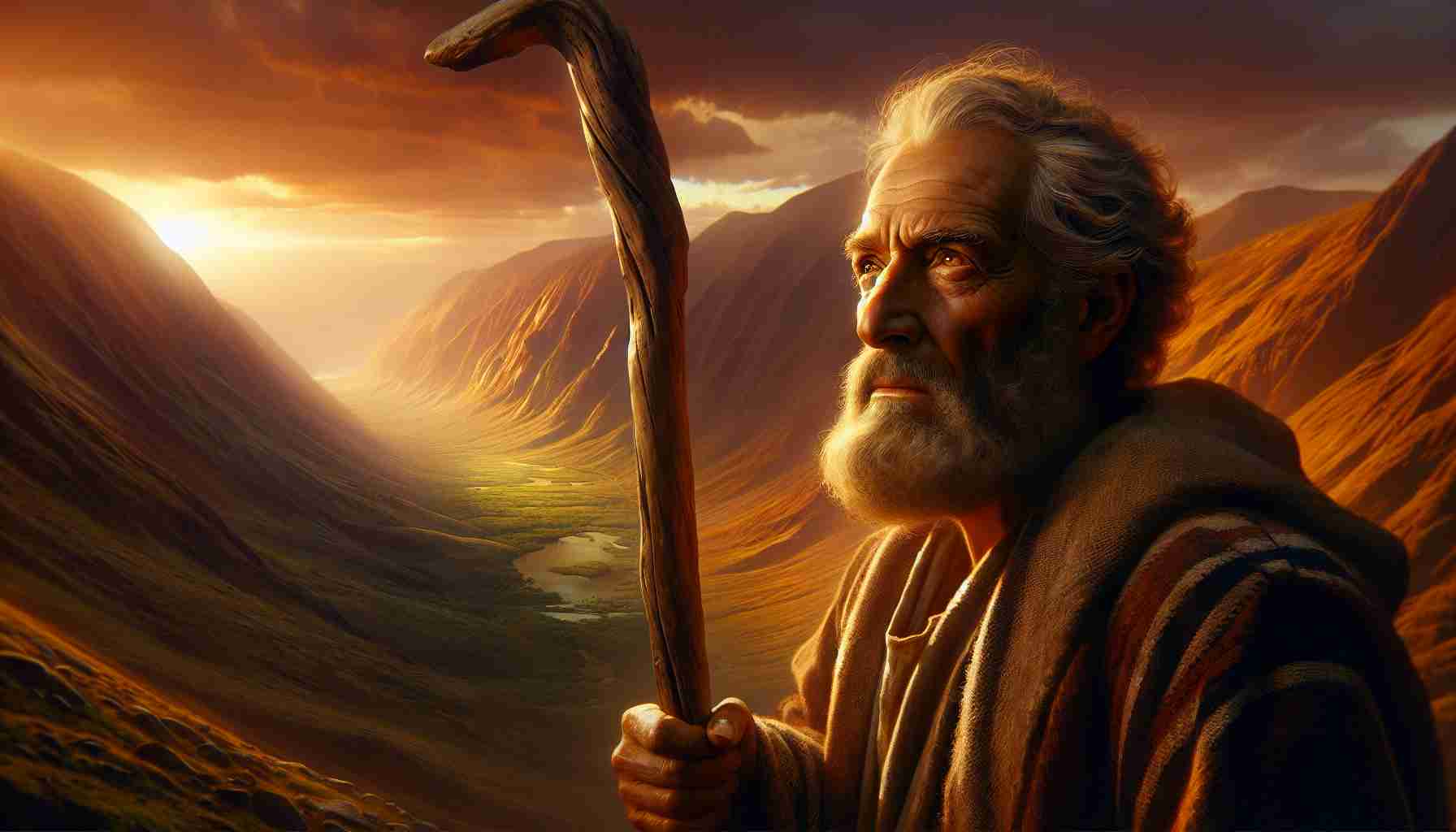

His knees gave first.
A tremor rolled through his legs—was it fear, or the years?—and Moses dropped to the ground. The dust of Nebo clung to his robe. There was no one to catch him. That was how he wanted it.
Below, the land stretched wide and impossible: hills stitched with olive groves, valleys gold with wheat, the tabernacle of God’s promise laid open on the horizon. The Lord had lifted the veil from his eyes, and he saw it all—Naphtali to the north, the fields of Ephraim and Manasseh, the far glinting waters beyond Jericho. Home.
Not for him.
He leaned forward, gripping a stone, pressing his forehead to its cool surface. Wind hissed over the ridge, the same wind that used to circle his tent when the people grumbled, the same wind that whispered when he first met the Voice in fire.
He closed his eyes. “Adonai,” he whispered.
No thunder. No glow.
But He was there.
“I led them,” Moses said aloud, the words weak against the wind. “Forty years. In circles. Through storms. I spoke as You said. I struck the rock once—it was foolishness—but even that… could not You have…”
He stopped.
That anger. Still waiting under his ribs like a coiled thing.
He let it go.
He sat back, hands folded in his lap. “They belong there, not me.” The admission was dry in his mouth. “You were right.”
His bones ached with the weight of memory. Egypt’s gold, shattered on the mountain. The Red Sea, split wide by breathless obedience. Faces blurred in smoke and glory. Too many buried along the way.
He imagined them now—all those he’d buried. He imagined turning to them, saying, It was not for us, but for them. The children running at the foot of the mountain while fathers wept for the future they would never hold.
The ache softened.
Below, the sun turned bronze. Smoke curled from a single campfire in the plains. Israel—his people—were already breaking bread, passing stories, making plans. Joshua would lead them now.
“I was never meant to finish it.”
His breath slowed.
He had never truly rested.
A hand once reached out to him from a burning bush and said Go. Never again had he paused since. The weight of stone tablets rent his arms. The prayers of a thousand exhausted nights warped his back. The inescapable nearness of God—it had worn him thin, split him open, left him changed.
But now—
He looked across the land one last time. His eyes did not dim.
“I see it,” he said, voice soft.
The wind answered.
And then he lay back, arms folded across his chest, the robe loose at the neck, one palm turned upward.
No cry.
No trumpet.
Just the hush of dust settling.
And a silence filled with God.
His knees gave first.
A tremor rolled through his legs—was it fear, or the years?—and Moses dropped to the ground. The dust of Nebo clung to his robe. There was no one to catch him. That was how he wanted it.
Below, the land stretched wide and impossible: hills stitched with olive groves, valleys gold with wheat, the tabernacle of God’s promise laid open on the horizon. The Lord had lifted the veil from his eyes, and he saw it all—Naphtali to the north, the fields of Ephraim and Manasseh, the far glinting waters beyond Jericho. Home.
Not for him.
He leaned forward, gripping a stone, pressing his forehead to its cool surface. Wind hissed over the ridge, the same wind that used to circle his tent when the people grumbled, the same wind that whispered when he first met the Voice in fire.
He closed his eyes. “Adonai,” he whispered.
No thunder. No glow.
But He was there.
“I led them,” Moses said aloud, the words weak against the wind. “Forty years. In circles. Through storms. I spoke as You said. I struck the rock once—it was foolishness—but even that… could not You have…”
He stopped.
That anger. Still waiting under his ribs like a coiled thing.
He let it go.
He sat back, hands folded in his lap. “They belong there, not me.” The admission was dry in his mouth. “You were right.”
His bones ached with the weight of memory. Egypt’s gold, shattered on the mountain. The Red Sea, split wide by breathless obedience. Faces blurred in smoke and glory. Too many buried along the way.
He imagined them now—all those he’d buried. He imagined turning to them, saying, It was not for us, but for them. The children running at the foot of the mountain while fathers wept for the future they would never hold.
The ache softened.
Below, the sun turned bronze. Smoke curled from a single campfire in the plains. Israel—his people—were already breaking bread, passing stories, making plans. Joshua would lead them now.
“I was never meant to finish it.”
His breath slowed.
He had never truly rested.
A hand once reached out to him from a burning bush and said Go. Never again had he paused since. The weight of stone tablets rent his arms. The prayers of a thousand exhausted nights warped his back. The inescapable nearness of God—it had worn him thin, split him open, left him changed.
But now—
He looked across the land one last time. His eyes did not dim.
“I see it,” he said, voice soft.
The wind answered.
And then he lay back, arms folded across his chest, the robe loose at the neck, one palm turned upward.
No cry.
No trumpet.
Just the hush of dust settling.
And a silence filled with God.